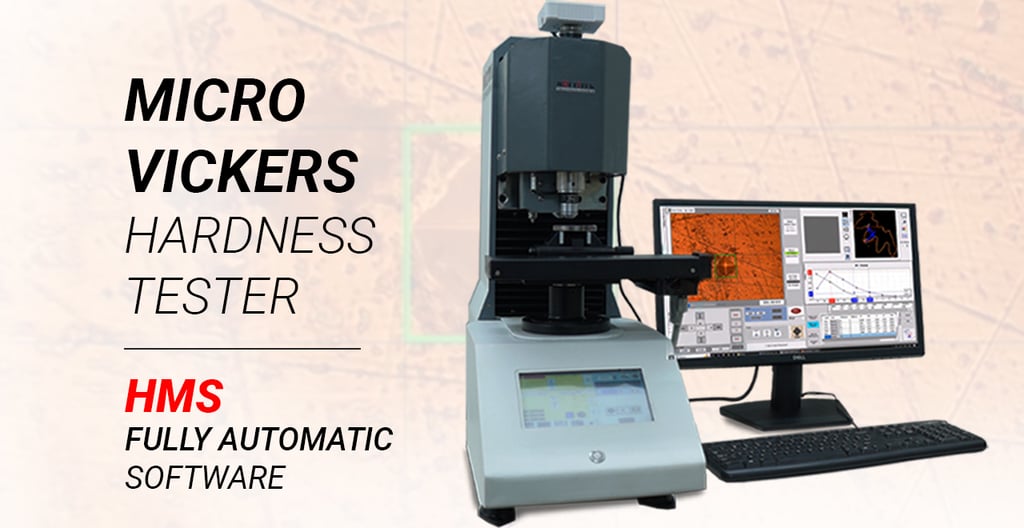Precision on a Microscopic Scale: A Complete Guide to Micro-Vickers Hardness Tester Calibration
Ensure microscopic precision in your material testing. This complete guide to NABL-accredited Micro-Vickers hardness tester calibration shows why certified accuracy is essential for your business.
Admin
7/6/20255 min read


In the modern landscape of material science, manufacturing, and quality control, the ability to measure the properties of a material with microscopic precision is not just an advantage—it's a necessity. From thin films and coatings to case-hardened components and tiny welds, a material's integrity often depends on its hardness at a micro-level. The instrument of choice for this critical task is the Micro-Vickers Hardness Tester. But like any high-precision instrument, its reliability hinges on one crucial factor: professional, periodic calibration.
For industries that cannot afford to compromise on quality, partnering with a trusted and accredited calibration service is essential. Multitek Calibration Pvt. Ltd., an NABL-accredited leader in New Delhi, stands as the premier expert in the field, providing meticulous calibration services that ensure the accuracy and reliability of your micro-Vickers hardness testers. This comprehensive guide will walk you through the importance of this process, the technical details of the test, and why Multitek is your ideal partner for maintaining the integrity of your quality control. Learn From Our YouTube Channel!
What is Micro-Vickers Hardness Testing? A Primer
The Vickers hardness test, developed by Robert L. Smith and George E. Sandland at Vickers Ltd., is a versatile method for determining a material's resistance to indentation. It uses a diamond indenter shaped like a square-based pyramid with a precise 136° angle. A controlled force is applied, leaving a tiny, square-shaped indentation on the material's surface.
What distinguishes the micro-Vickers method from its macro-Vickers counterpart is the applied load. While macro-Vickers testers use loads from 1 kgf to 100 kgf, micro-Vickers testers operate in a much lower range, typically from 10 gf to 1000 gf (gram-force). This low-load application makes it perfect for measuring the hardness of:
Thin materials and foils: Materials too thin for other tests.
Case-hardened layers: Measuring the hardness of a hardened surface layer without being influenced by the softer core material.
Small components: Tiny gears, screws, and electronic parts where a macro indentation would destroy the sample.
Welds and heat-affected zones (HAZ): Analyzing the hardness variation within a small, critical area.
Coatings and platings: Ensuring the quality and durability of surface finishes.
Individual grains or phases in a microstructure: Essential for advanced materials research and metallurgy.
The hardness value, known as the Vickers Pyramid Number (HV), is calculated by measuring the two diagonals of the indentation under a high-power optical microscope and using a specific formula. The precision of this measurement is paramount, as a single micron of error can lead to a significant miscalculation of hardness.
The Silent Enemy: The Need for Micro-Vickers Hardness Tester Calibration
Even the most sophisticated micro-Vickers tester is susceptible to error over time. Factors such as regular use, environmental conditions (like temperature and humidity), and the delicate mechanics of the instrument can cause its measurements to drift out of tolerance. This drift is a critical issue for any company relying on hardness testing for quality assurance. Visit Multitek's Product catalogue Page!
Using an uncalibrated tester can lead to a host of problems:
Inaccurate Quality Control: A false reading could lead you to accept a batch of materials that don't meet specifications, or reject a perfectly good one, causing unnecessary waste and costs.
Product Failure and Safety Risks: In critical applications, such as aerospace or automotive parts, a miscalculated hardness value can lead to premature wear, component failure, and even catastrophic accidents.
Loss of Traceability: Without a current, traceable calibration certificate, your quality management system lacks the verifiable data needed for internal audits, customer requirements, and regulatory compliance.
Legal and Reputational Damage: Product failures linked to faulty testing can result in costly recalls, loss of customer trust, and severe legal repercussions.
This is where professional calibration becomes indispensable. It is not merely an optional maintenance step; it is a foundational pillar of a reliable quality management system, ensuring that every measurement you make is accurate and trustworthy.
Multitek's NABL-Certified Micro-Vickers Hardness Tester Calibration
At Multitek Calibration, we understand that precision is non-negotiable. Our calibration process is not just a check; it's a comprehensive verification and adjustment service that brings your instrument back to its peak performance, in full compliance with national and international standards.
Our services are accredited by the National Accreditation Board for Testing and Calibration Laboratories (NABL), a mark of technical competence and quality. This accreditation, based on the ISO/IEC 17025 standard, signifies that our procedures, equipment, and personnel have been rigorously audited and deemed capable of providing the highest level of accuracy and reliability.
Our calibration process is a meticulous, multi-step procedure that aligns with international standards such as ISO 6507. It typically includes:
1. Preliminary Inspection and Cleaning: Our expert technicians begin with a thorough visual and mechanical inspection. We check for any physical damage, wear on the indenter, and ensure the machine is clean and free from debris that could affect its operation.
2. Direct Verification: This step involves calibrating the core components of the tester itself.
Force Application System: We verify the accuracy of the applied test loads using a calibrated force-measuring device. We ensure that the deadweights and the loading mechanism deliver the exact force specified, without shock or vibration.
Indenter Geometry: The diamond indenter is a critical component. We verify its shape, angle (136° ± 0.5°), and condition to ensure it is not chipped or worn, which would lead to incorrect indentations.
Measurement System: The optical microscope, stage micrometer, and any integrated software are calibrated. This is crucial for accurately measuring the minute diagonals of the indentation. We use a certified stage micrometer to verify the scale and resolution of the optical system.
3. Indirect Verification: This is the practical performance test of the entire system.
We use NABL-certified reference hardness blocks with a known and traceable hardness value.
Multiple indentations are made on these blocks at various points, and the hardness is measured.
The results from your tester are compared against the certified values on the reference blocks to determine the measurement error and uncertainty.
This step confirms that the entire system—the applied force, indenter, and measuring system—is working together accurately.
4. Adjustment and Certification: If any deviations are found, our technicians make the necessary adjustments to bring the instrument back into full compliance. A comprehensive, traceable calibration certificate is then issued. This certificate details the instrument's performance before and after calibration, the standards used, the environmental conditions during the test, and the statement of conformity. It serves as your official record for quality audits and customer requirements.
Beyond Calibration: The Multitek Advantage
Choosing a calibration partner is about more than just a service; it's about a commitment to excellence. Multitek offers several key advantages that make us the ideal choice for your micro-Vickers hardness tester calibration needs:
NABL Accreditation: Our accreditation is your guarantee of competence and reliability, giving you globally recognized certificates you can trust.
On-Site and In-Lab Services: We provide flexible service options, including on-site calibration at your facility to minimize downtime and disruption to your operations. For more complex calibrations or those requiring highly controlled environments, our state-of-the-art laboratory is ready to serve you.
Expert Team: Our highly trained and experienced engineers have a deep understanding of hardness testing equipment. They can diagnose issues, provide expert advice, and ensure your machine is operating at its best.
Comprehensive Services: Beyond micro-Vickers, we provide calibration for a wide range of hardness testers, including Rockwell, Brinell, and macro-Vickers, as well as a full spectrum of mechanical and metrological instruments.
Conclusion: Invest in Precision, Secure Your Future
In an industry where a single mismeasurement can have significant consequences, the accuracy of your micro-Vickers hardness tester is not a luxury—it's an essential investment. Regular, professional calibration by an NABL-accredited service like Multitek Calibration Pvt. Ltd. is the only way to ensure the integrity of your material testing, protect your product quality, and safeguard your business's reputation.
Don't leave your precision to chance. Partner with Multitek and gain the confidence that comes from working with a leader in certified calibration. Ensure every measurement you make is a testament to quality, precision, and reliability.
Quality
NABL Precision calibration laboratory for accurate measurement standards.
Trust
Service
service@multitek.in
+91-7836009222, 7836009922
© 2025. All rights reserved.
Visit Our Other Websites -
Calibration Services - https://www.mcpl.com
Measuring Scale Calibrator - https://www.scaletape.com
Multitek Industrial Instruments - https://www.multitek.in
Custom Micro Vickers - https://www.microvicker.com
Special Purpose Machine (SPM) - https://www.makemyspm.com
UCI Hardness Testing - https://www.ucihardness.com
